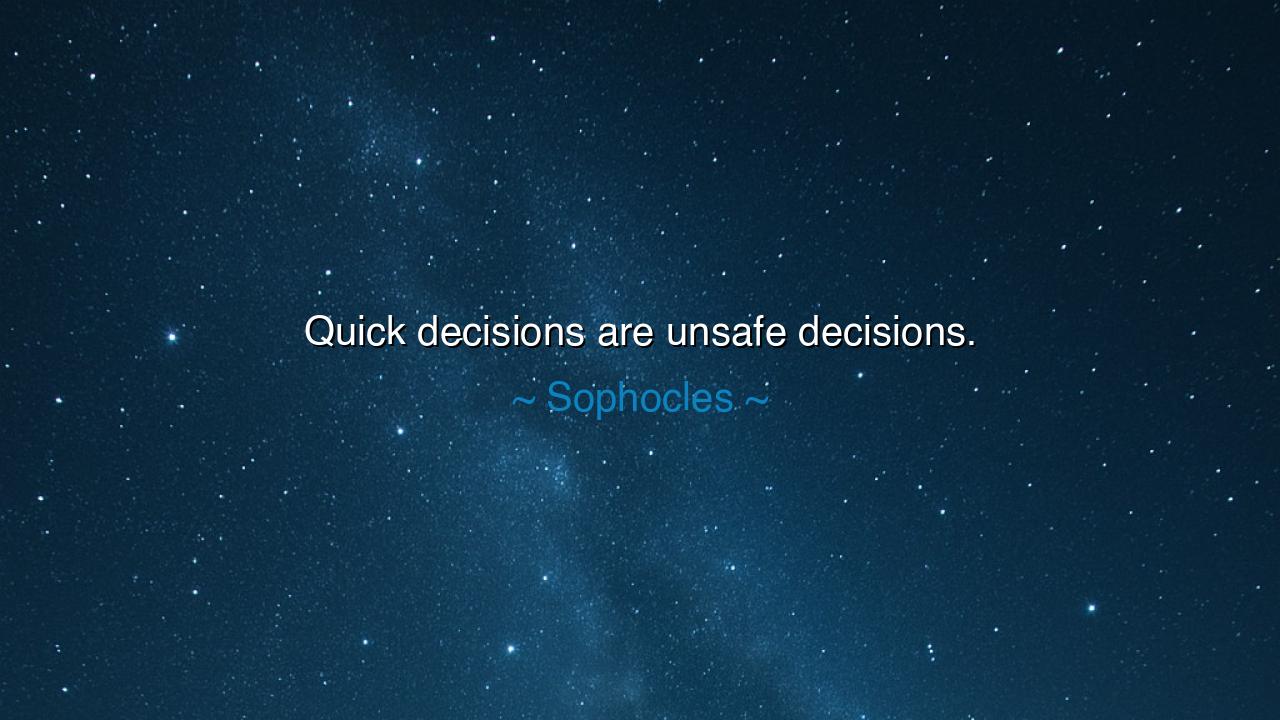
Quick decisions are unsafe decisions.






"Quick decisions are unsafe decisions." Thus warned Sophocles, the tragedian of Athens, whose plays revealed the frailty of kings and the doom of rash hearts. His words are as a torch in the dark, reminding us that haste is the companion of folly. For the soul that leaps without thought often falls into ruin, while the one who pauses, weighs, and considers walks the path of safety and wisdom.
The ancients saw this truth written in their histories and myths. How often did the rash hero, driven by passion, bring destruction upon himself? In the tale of Oedipus, a single quick decision upon the road—born of anger, not of reason—led to a lifetime of tragedy. Sophocles, who told his story, understood that the swiftness of wrath blinds judgment, and that the fate of nations may crumble from a moment’s impatience.
History too bears witness. When Napoleon invaded Russia in 1812, it was a quick decision, driven by pride and impatience. He marched his armies with little regard for the immensity of the land or the cruelty of winter. The result was disaster: hunger, cold, and death, his empire broken upon the snows. A slower counsel might have preserved his throne, but haste delivered him to ruin.
Yet the wise have shown the opposite. George Washington, in the war for independence, often resisted the cry for reckless battle. He understood that waiting, retreating, and choosing carefully preserved his fragile army. Though mocked for caution, his deliberate choices led to ultimate victory. Where a quick decision might have destroyed the cause, patience became its salvation.
So let this lesson be carried forward: when the storm rises, and all demand immediate action, hold fast your heart. Consider, weigh, reflect—for in haste lies danger, and in patience lies strength. Sophocles speaks across the ages: resist the lure of quick decisions, for they are often unsafe decisions. Better to walk slowly on firm ground than to run swiftly into the abyss.






GDGold D.dragon
Leading teams, I struggle with the optics of decisiveness versus the reality of risk. People crave momentum, but they also need to trust the guardrails. Could you propose a cadence that maintains both? Perhaps: publish decision criteria before debate, tag each choice as reversible/irreversible, set a short “challenge window,” and designate a rotating “risk captain” to articulate worst-case pathways. Afterward, run a 15-minute after-action: what went right for the wrong reasons, and what would change if we had one more day? I’m aiming for confidence without bravado.
MVngo minh vu
Time pressure seems to amplify predictable bugs—overconfidence, confirmation bias, and scope neglect. If that’s the case, what are the lightest-weight countermeasures? I’m imagining a three-question speed bump: What would convince a smart skeptic I’m wrong? What’s the outside view (median outcome for similar cases)? What single variable most changes the answer, and can we cheaply test it? I’d also like guidance on red flags that require a pause: novel domain, one-shot stakes, or misaligned incentives. How do we institutionalize this without gumming up routine calls?
MTPham Minh Tri
In emergencies, hesitation can be lethal, yet snap judgments under cortisol tend to tunnel vision. I’m looking for an upstream solution: protocols that make rapid action safe because the slowness already happened in rehearsal. What mix of checklists, simulation reps, and decision drills best preserves judgment under heat? Could you sketch a monthly practice—one scenario laddered from routine to rare, a debrief with error taxonomy, and a tweak to the playbook—so that fast execution still reflects slow thinking done earlier?
VPNguyen vu phong
As a reader, I’m skeptical of blanket speed shaming—sometimes the clock is part of the problem, not a distraction. What I want is a way to decide how fast to decide. Could you offer a tiny rubric that travels well? For example: 1) Is the choice reversible? If yes, time-box and move. 2) What base rate applies? Name it before anecdotes. 3) What’s the minimal information that could flip me? Go get only that. 4) Who bears the downside? If it’s others, slow down and widen consultation. I’d love a one-page card I can keep near my desk.